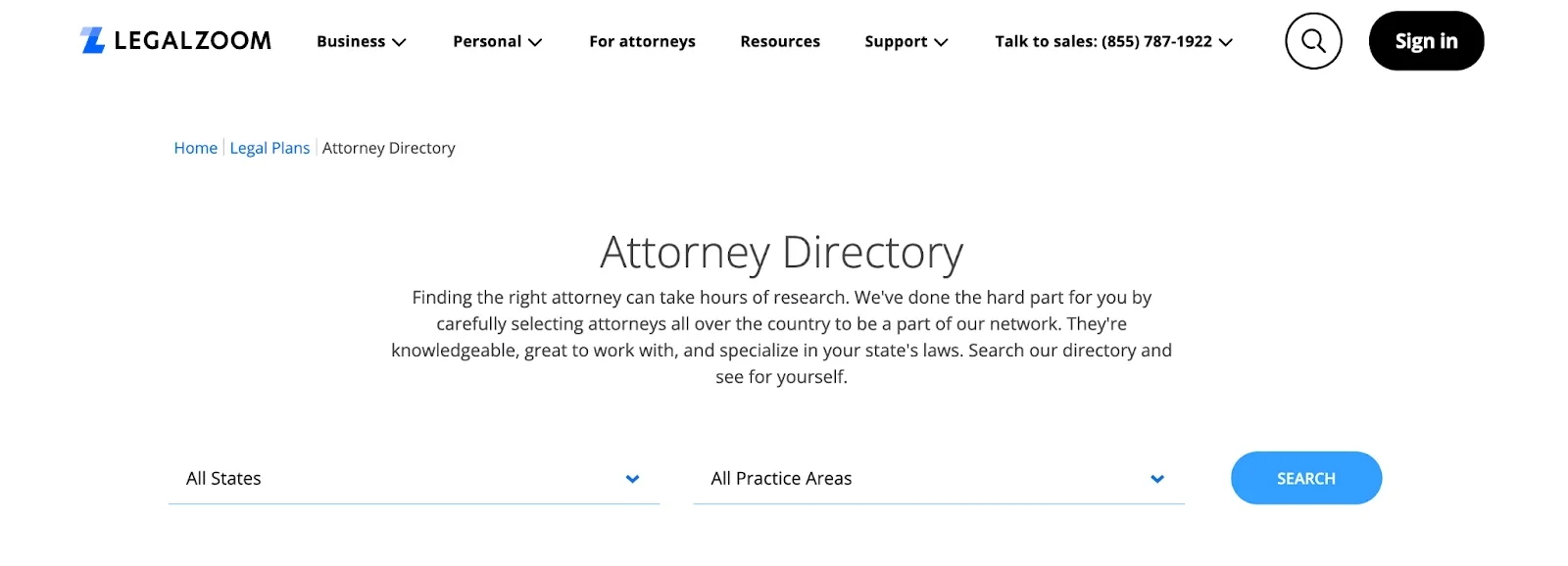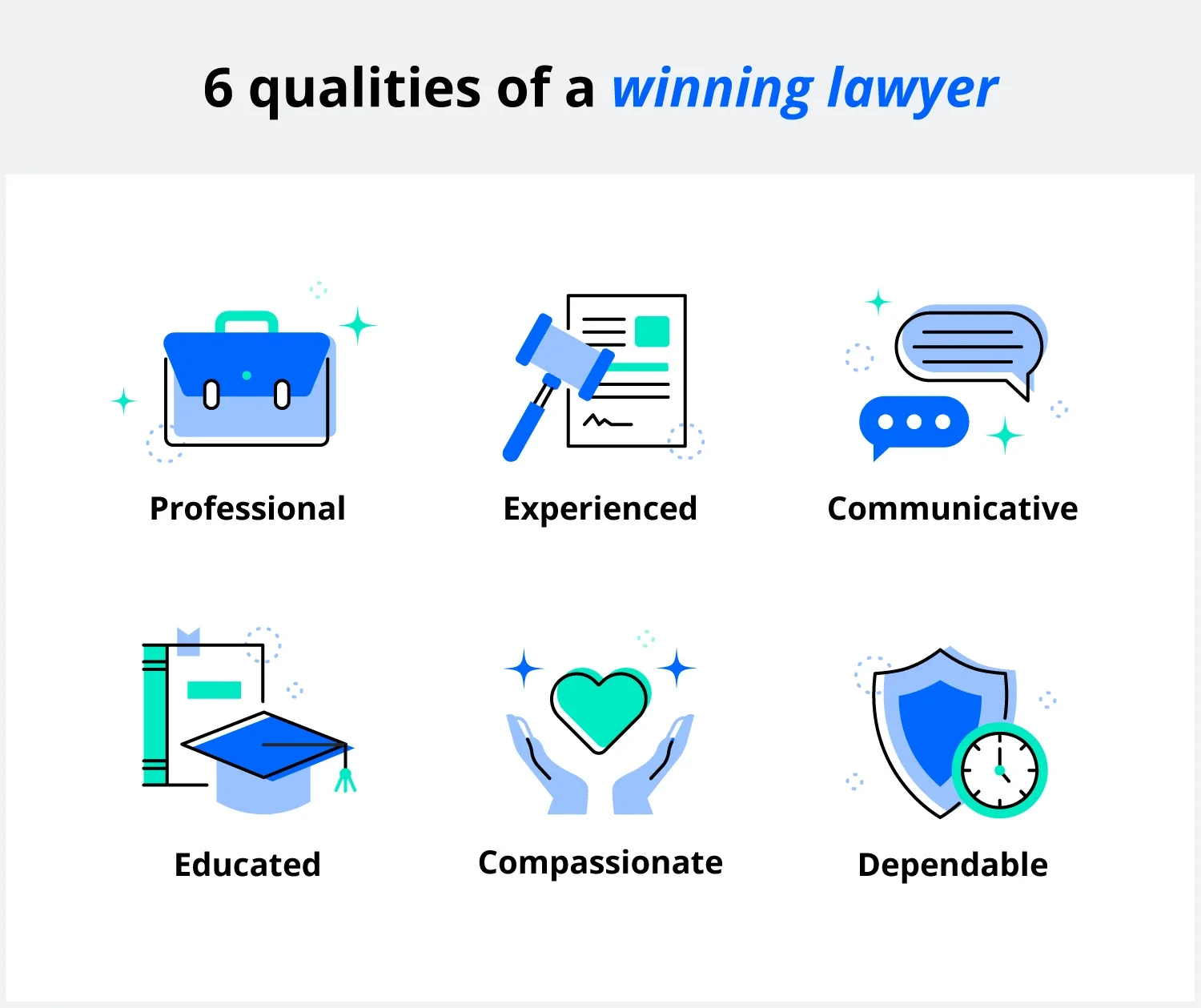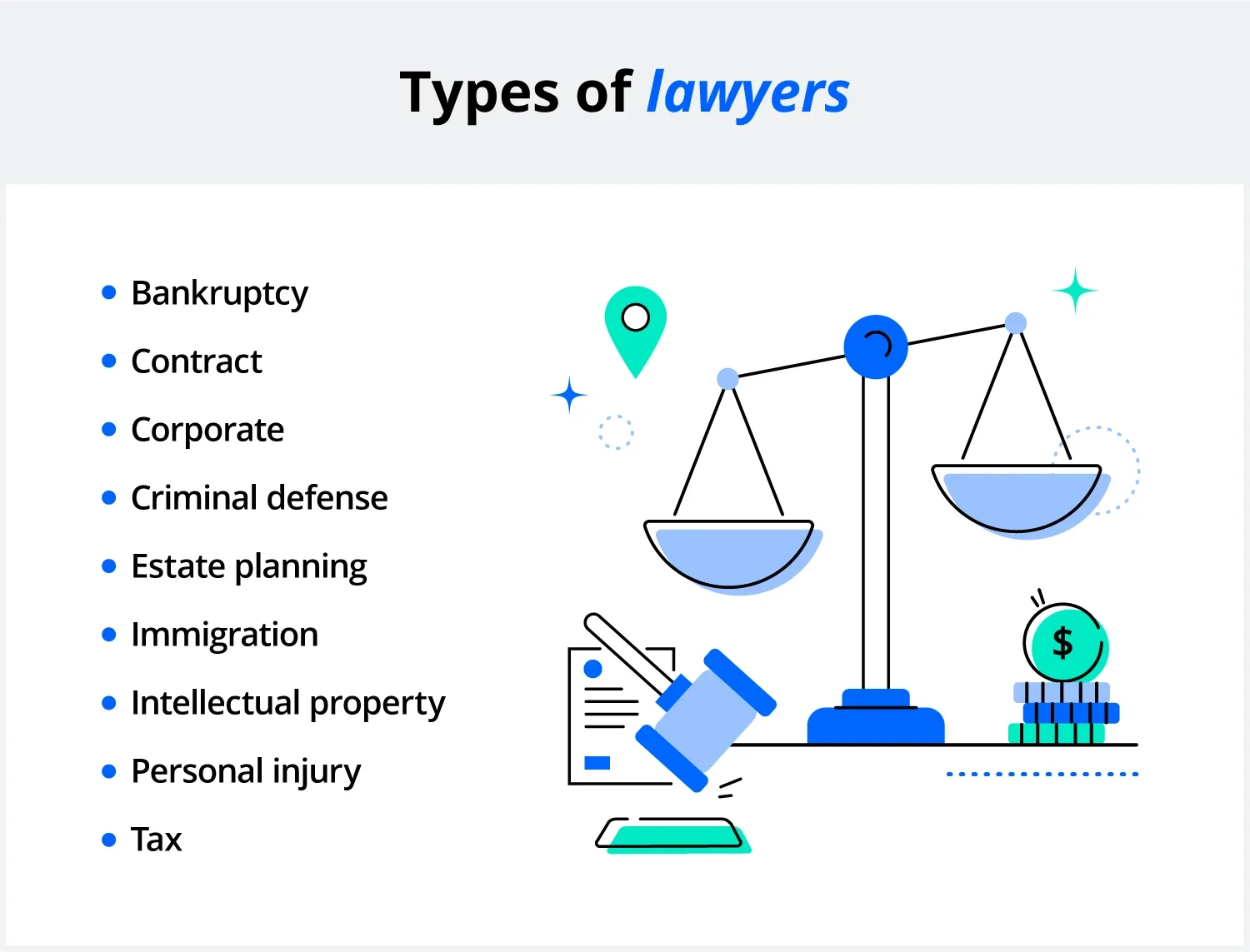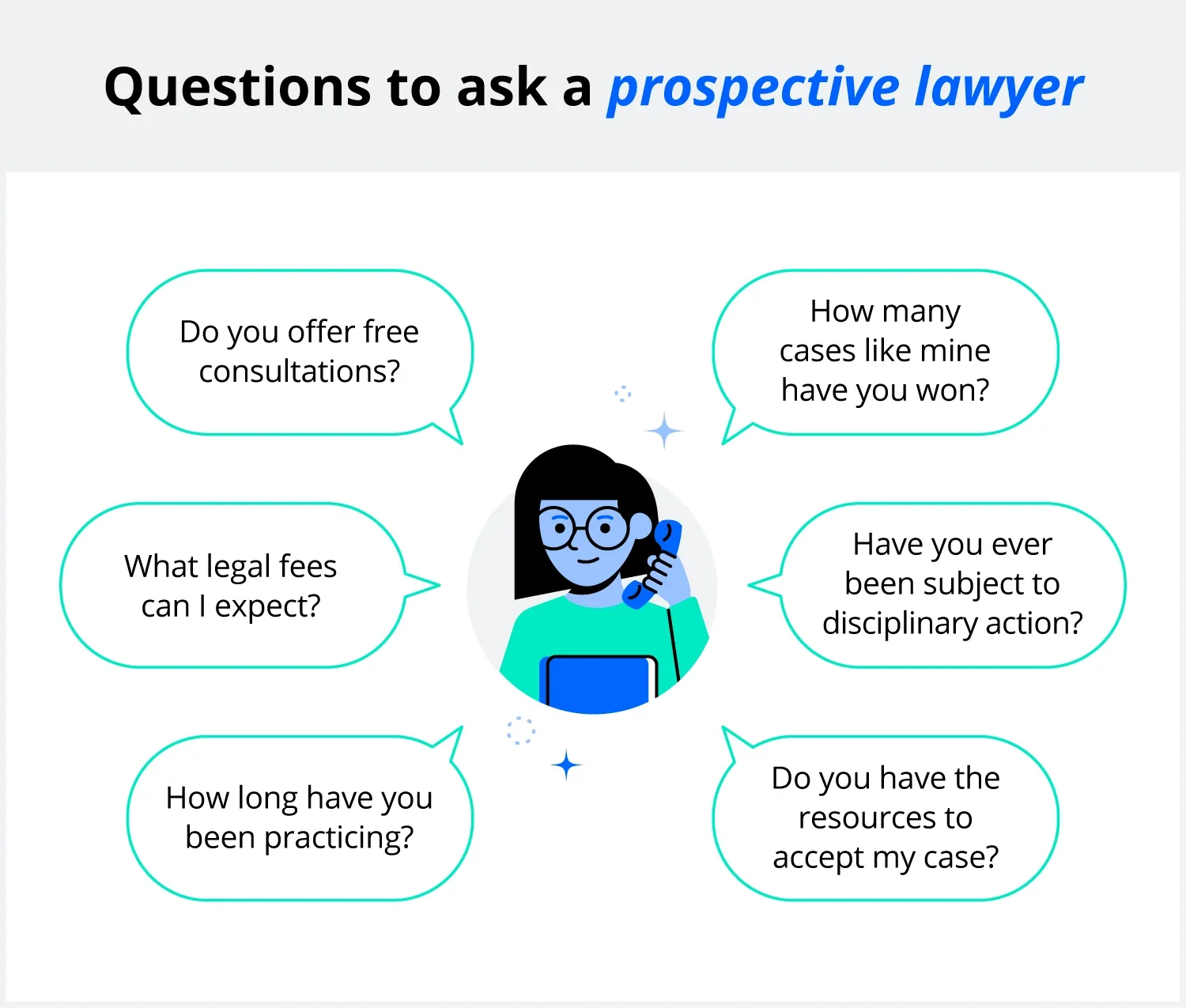While you don't need to find a lawyer to deal with every legal situation you encounter, legal counsel can give you peace of mind when negotiating contracts, going to court, settling property disputes, or navigating other matters.
Retaining a lawyer can also help you avoid legal disputes altogether by ensuring you stay compliant with local, state, and federal laws.
Below, we'll cover when you should hire a lawyer, characteristics, and qualifications to look for, questions to ask, and additional considerations. Here are eight things to think about when hiring a lawyer.
- Understand when to hire a lawyer
- Identify what to look for in a lawyer
- Consider legal specialties and types of lawyers
- Use different search methods to find a lawyer
- Know the right questions to ask prospective lawyers
- Schedule a legal consultation
- Choose the best lawyer for your case
- Explore other options as needed
1. Understand when to hire a lawyer
There's no clear-cut answer as to when you should hire a lawyer, but generally, you should hire one if you need legal advice or representation. Many people will hire an attorney due to an event such as a(n):
- Accident
- Adoption
- Arrest
- Business launch
- Death
- Divorce
- Lawsuit
- Lottery win
- New contract
Even if you think a suit you're a party in will be dismissed or you can settle out of court, an attorney can help you understand the upcoming process and mitigate risks to you or your business.
What is the difference between an attorney and a lawyer?
All lawyers are attorneys, but not all attorneys are lawyers.
A lawyer is anyone with a legal education who has earned a Juris Doctor (J.D.) degree. It's an umbrella term that also encompasses attorneys. An attorney is a lawyer who passed the bar examination and has met the licensing requirements to practice law in their jurisdiction.
Some things an attorney can do that a lawyer cannot include:
- Representing clients in court
- Advise clients on the law
- Sign pleadings
- Take depositions
2. Identify what to look for in a lawyer
When dealing with a stressful legal matter, you must ensure you have the best lawyer for the job. Often, you can tell if a lawyer is good the first time you meet them by having a conversation and seeing what traits they exhibit.
Some characteristics of a good lawyer include:
- Professionalism
- Track record of case wins
- Compassion for clients
- Extraordinary communication skills
- Relevant experience
- Quality education
- Problem-solving capabilities
Some red flags to keep an eye out for when hiring a lawyer include:
- Tardiness
- Deceitfulness
- Poor communication skills
- Procrastination
- Bad reviews
- Hidden fees
- High case loss rate
3. Consider legal specialties
If you need a lawyer who can provide legal advice about estate planning, simple contracts, traffic violations, custody arrangements, or other standard legal situations, you will probably be just fine with a general practice attorney.
However, if you find yourself in a unique legal situation, you may want to find an attorney specializing in a niche law area.
Not sure what kind of attorney to hire? Check out this list of legal specialties:
- Bankruptcy lawyer: If you have been experiencing financial hardship, a bankruptcy attorney can help you file for bankruptcy or explore alternatives.
- Contract lawyer: If you're writing or planning to sign a contract, a contract lawyer can review it to ensure it's legally sound and beneficial to you.
- Corporate lawyer: A corporate lawyer can help you navigate compliance and governance issues if you have a corporation.
- Criminal lawyer: If you have been charged with a crime, a criminal defense lawyer can defend you in court and maybe even get your case dismissed.
- Divorce lawyer: If you're getting divorced, looking into spousal support, or calculating child support, you'll want a lawyer specializing in family law.
- Disability lawyer: If you have a disability and need accommodations or government benefits, talk to a disability lawyer.
- Estate-planning lawyer: If you need help writing a will or planning your estate, an estate lawyer can help you.
- Immigration lawyer: If you run into immigration issues surrounding your visa, citizenship, DACA status, or green card, an immigration lawyer can tell you more about your options and next steps.
- Intellectual property lawyer: If your business has copyrights, patents, trademarks, or trade secrets, an IP lawyer can help your business protect them.
- Medical malpractice: If a physician's negligence negatively impacts your health or well-being, talk to an attorney about your legal options.
- Personal injury lawyer: If someone else's actions or negligence caused you to get hurt in an accident, a lawyer specializing in personal injury cases could help you get compensation.
- Real estate lawyer: If you plan to buy or sell property, ask a real estate lawyer to review relevant documents and contracts.
- Tax lawyer: If your taxes are complicated or the IRS audits your return, a tax attorney can advise you.
The cost and availability of attorneys may vary based on the specialty you need and your location.
4. Use different search methods to find a lawyer
There are many great ways to find a reputable lawyer, but the easiest way is generally to start looking online or asking people you trust for suggestions.
Search attorney databases
You can run an attorney search in a trusted database like LegalZoom's directory, which provides information such as practice areas, location, professional backgrounds, and reviews. All you need to provide to get started is your:
- Preferred practice area
- State
Some advantages of online databases are that it's easy to read client reviews, find vetted local lawyers, and contact them directly for information about their services.
When you schedule a consultation through LegalZoom, you can consult with up to six attorneys in one year to ensure you can find the right fit for you.
Take your search online
Many people find lawyers online. The easiest way to begin your search for a reputable lawyer is to type relevant keywords into the search engine. Here are some search strings to help you find lawyers in your area:
- [Niche] lawyer [City]
- [Niche] lawyer near me
- Lawyers near me
- [Niche] attorney [City]
If you need a general practice attorney, you can write “general" in the “[Niche]" section or remove it altogether.
You can also consult your state or local bar association for an attorney directory with a list of lawyers in your area.
Tip: As you begin your search, keep a running list of lawyers you're considering with notes about what you do and don't like about each. This will help you make your final decision.
Tap into your network
Ask your family, friends, co-workers, and acquaintances to see if they know of any attorneys they could recommend. Personal references can be some of the most reliable references you will find.
You can also ask a lawyer you know and trust, even if they don't practice in the area of law in which you need legal help. They may be able to recommend colleagues who can handle your case.
Read legal firm reviews
Once you have a list of legal firms you're considering, read their reviews. On review sites, former and current clientele can share their experiences, and you can determine whether you're willing to take a chance on the firm.
When you're ready to start reading law firm or lawyer reviews, check out some of these platforms:
- Better Business Bureau (BBB)
- Google reviews
- Yelp
5. Know the right questions to ask lawyers you're considering
Now that you have some attorney options, it's time to choose. To get you started, here's a list of questions to ask a lawyer before hiring them:
Do you provide a free consultation?
Most lawyers offer prospective clients a free consultation to answer their questions and determine if they're a good fit. However, some lawyers charge a nominal fee to protect their time and themselves should you choose another attorney, costing them the chance to represent your opposition.
If the attorney you're considering charges a consultation fee, ask about it before scheduling the appointment. You can also ask for a complete list of fees to ensure they don't secretly tack extra charges onto your invoice.
What are your fees?
In the U.S., lawyers generally charge between $100–$400 for their hourly rate. Of course, a lawyer's rates can fall outside this range depending on their experience and caseload.
Some other fees you may encounter include:
- Consultation fees: As discussed earlier, some attorneys may charge a consultation fee. However, many will waive this.
- Contingency fees: When your case settles, your attorney will be entitled to a percentage of the amount—generally up to 40%, according to the ABA. If you have a contingency agreement, you shouldn't have to pay for legal counsel upfront.
- Processing fees: In some jurisdictions, law firms may charge clients to cover the ACH transaction fee if they pay with a credit card.
- Retainer fees: This is an amount the client pays to the attorney upfront to secure representation later. It acts as a down payment on future legal fees.
Before signing anything or committing to services, verify what services are included in the price quote, whether you can pay the amount in installments, and how much you should expect to pay to settle your case.
How long have you been a practicing attorney?
While a recent law school graduate can be incredibly talented and capable, this is still an important question. If it's important to you to have an experienced lawyer with plenty of wins under their belt, you should consider asking them:
- When did you graduate from law school?
- What year did you pass the bar?
If a prospective attorney doesn't have much experience, ask them why they think they can successfully represent you:
- How many internships did you complete during law school?
- Where did you intern?
- What experiential learning opportunities did you have that prepared you to defend my case?
How many cases like mine have you won?
An attorney's win rate is crucial because it indicates how likely they are to win your case. However, it's important to remember that this stat only holds up if they've represented cases similar to yours.
Here are some examples of questions you can ask prospective lawyers:
- How many cases have you represented?
- How many of those cases were similar to mine?
Have you ever been the subject of disciplinary action?
It's important to know if a prospective attorney has been subject to disciplinary action because of professional misconduct. Some examples of lawyer misconduct include:
- Overbilling or charging excessive fees
- Hiding evidence
- Conflicts of interest
What is your current caseload?
Before selecting an attorney, make sure they have the time to take your case and can properly represent you. You should also ask how much of your case they will personally attend to and which duties they will offload to their co-workers.
Here are some questions you can ask to gauge how they will split up work:
- How much research do you do to prepare court opinions?
- Which members of your team will help formulate a legal strategy for my case?
- How much research will interns and junior attorneys be responsible for?
- Will you be the sole attorney representing me in court?
All of this can help you determine if you'll get the representation you think you're paying for.
6. Schedule a legal consultation
Once you have a short list of attorneys, schedule a consultation to:
- Discuss the details of your case
- Obtain advice and legal strategy recommendations
- Review rates and fees
- Look over the service contract
- Ask questions
- Get to know your attorney
Generally, you can call a law firm to set up a legal consultation or fill out a form on the firm's website with just your name and phone number. Don't be afraid to schedule consultations with multiple lawyers to find the right person to represent you.
During the consultation, note how they run their office, whether there is sufficient support staff, and how professionally they treat you. Pay close attention to factors such as how long it took for the attorney to return your initial contact and whether you have their sole focus during your conversation.
Discuss the client intake process at your chosen firm
Request a breakdown of their intake and onboarding process. Some common things you can expect during this process include:
- Checking for conflicts of interest
- Signing a fee agreement
- Explaining how you will make payments
- Setting expectations
- Discussing next steps and your overall legal strategy
- Collecting information via an intake questionnaire
- Providing you with their policies
Now that you've done your research, it's time to make your decision. Go through your notes about each option and review the pros and cons of each. To recap, you may want to compare:
- Experience
- Cost
- Specialties
- Rapport and communication
If you dislike your options, you have a couple of options: Repeat the search process or look into local governmental or nonprofit resources for criminal defense aid, or represent yourself.
It is generally ill-advised to represent yourself. However, there are some examples of self-representation success.
What are your options if you need a lawyer but can't afford one?
If you need legal assistance, but it's not a financially viable option for you, you still have options. The options below are available in criminal cases, not civil. There may be local organizations or legal aid offices supporting civil cases, though this isn't as common.
- Legal aid: Generally, local organizations will offer free or discounted legal services for those in need. You can find information about legal aid programs online.
- Pro bono lawyer: Pro bono lawyers offer professional legal services for free or at a low cost. If you need a lawyer rather than just money for legal services, you can also contact legal aid for information about that.
- Public defender: If the court finds you “indigent"—incapable of paying for a private lawyer—they can appoint you a public defender to ensure you have sufficient representation in criminal cases.
In most cases, you will need to meet specific financial guidelines to be eligible for legal assistance. The court may calculate your need based on your income, the size of your family, and where you live.
Take advantage of the vetted LegalZoom attorney network
As a potential client, you can also ask attorneys for references from past or present clients during a legal consultation. Or you can find a lawyer using a legal directory full of vetted professionals.
You need to feel extremely comfortable with the person representing you and your interests, especially as you will likely be sharing private details about your life and possibly putting your future in their hands.
FAQs
What should I expect during an initial consultation with a lawyer?
When you first meet with a lawyer, you should expect to review the basics of your case, discuss potential legal strategies, and ask any questions you have. This consultation will give you a chance to assess the lawyer’s expertise and communication style and determine if they are a good fit for your needs. Most lawyers offer initial consultations for free.
How can I verify a lawyer's credentials and track record?
Check with your local or state bar association, look at online reviews and ratings, and ask for references from former clients to verify a lawyer's credentials. It’s also helpful to research any disciplinary actions or complaints filed against them.
What qualifications should I look for in a lawyer?
Look for a lawyer who has the appropriate credentials, such as a law degree from an accredited institution, a valid license to practice in your state, and membership in relevant professional organizations. It's also important to find a good lawyer with experience in the specific area of law that's relevant to your case.




